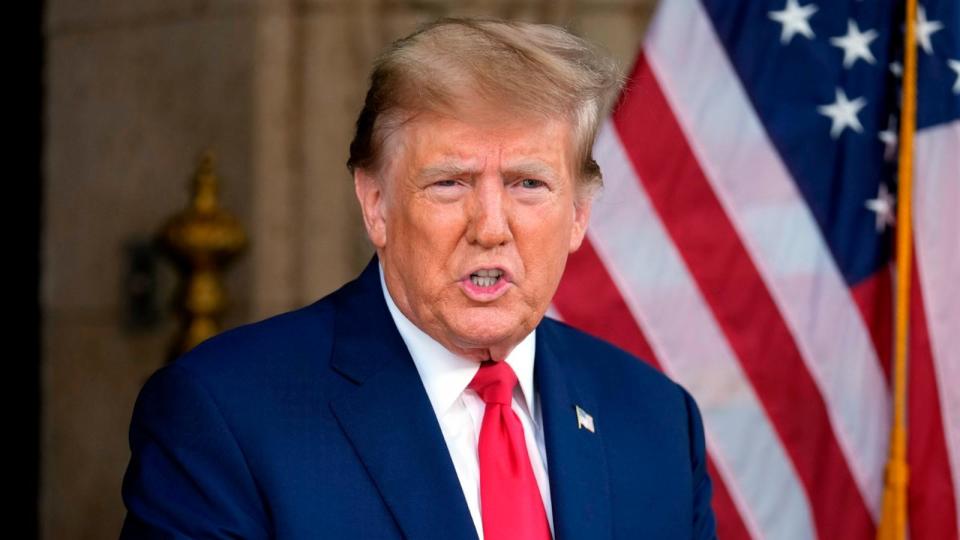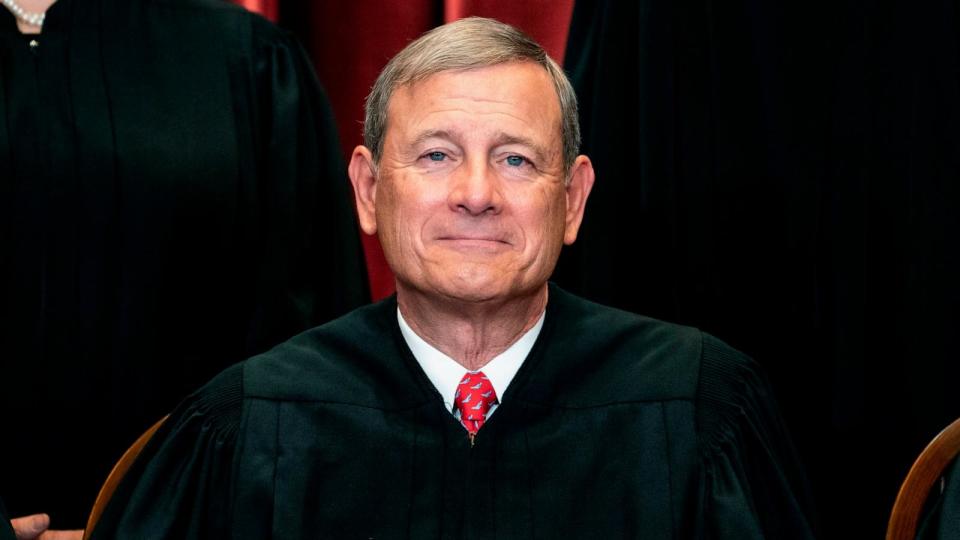Supreme Court hears historic Trump 14th Amendment case: Key moments
The U.S. Supreme Court on Thursday heard a historic case challenging Donald Trump's ability to hold office again over his role in the Capitol attack on Jan. 6, 2021.
Trump asked the justices to overturn an unprecedented Colorado Supreme Court decision deeming him ineligible to appear on the state's GOP primary ballot because, it said, he "engaged in insurrection." Trump has long denied any wrongdoing.
The legal battle centers on a previously obscure provision of the Constitution's 14th Amendment -- Section 3 -- ratified shortly after the Civil War.
Latest Developments
Feb 8, 1:59 PM
Justices skeptical of 14th Amendment case banning Trump from ballot
The nation's hight court appeared highly critical of a Colorado Supreme Court decision that would ban Trump from the state's 2024 GOP primary ballot under Section 3 of the 14th Amendment.
In more than two hours of oral arguments, each of the court's nine justices expressed skepticism that an individual state has the authority to deny a candidate for federal office from the ballot as an "insurrectionist."
While the court's ultimate decision is not always clear based on the questions raised during a hearing, it appeared likely that a majority of the court is ready to reverse the Colorado decision and put an end to efforts nationwide seeking to disqualify Trump under the rarely used, 150-year-old Constitutional provision.
Read more about takeaways from the arguments here.
-ABC News' Devin Dwyer and Isabella Murray
Feb 8, 1:34 PM
Trump speaks after arguments conclude
Donald Trump spoke from Mar-a-Lago in Florida moments after the arguments concluded at the U.S. Supreme Court in Washington.
The former president largely focused his criticism on President Joe Biden, but briefly addressed what transpired at the nation's high court.
"In watching the Supreme Court today, I thought it was a very beautiful process," he said. "I hope that democracy in this country will continue because right now we have a very, very tough situation with all of these radical left ideas."

Feb 8, 12:29 PM
Justice Alito expresses concern about states retaliating
Justice Samuel Alito, questioning the Colorado solicitor general, brought up the possibility of other states retaliating and excluding another candidate from their ballot.
Shannon Stevenson sought to downplay those concerns.
"I think we have to have faith in our system that people will follow their election processes appropriately," she said. "That they will take realistic views of what insurrection is under the 14th Amendment. Courts will review those decisions. This court may review some of them. But I don't think that this court should take those threats too seriously in its resolution of this case."
Feb 8, 12:12 PM
Attorney for Colorado secretary of state begins argument
Shannon Stevenson, the Colorado solicitor general, is now representing Secretary of State Jena Griswold. She is making the case that Colorado has the power, under state election code, to disqualify candidates who are ineligible to assume the office they’re seeking.
"Nothing in the Constitution strips the states of their power to direct presidential elections in this way," she said in her opening. "This case was handled capably and efficiently by the Colorado courts under a process that we've used to decide ballot changes for more than century. And as everyone agrees, the court now has the record that needs to to resolve these important issues."
Feb 8, 12:13 PM
Challengers' counsel argues this case is about 'protecting democracy'
Justice Brett Kavanaugh asked whether the high court should think about democracy when interpreting Section 3, specifically the right of the people to elect candidates of their choice.
Murray, in a lengthy answer, gave an impassioned argument that this case is at the heart of protecting democracy.
"Constitutional safeguards are for the purpose of safeguarding our democracy, not just for the next election cycle but for generations to come," he said. "And second, Section 3 is designed to protect our democracy in that very way. The framers of Section 3 knew from painful experience that those who had violently broken their oaths to the Constitution couldn't be trusted to hold power again again because they could dismantle our Constitution democracy from within."
"President Trump can go ask Congress to give him amnesty by a two-thirds vote but, unless he does that, our Constitution protects us from insurrectionists," he continued.
"This case illustrates the danger of refusing to apply Section 3 as written because the reason we're here is that President Trump tried to disenfranchise 80 million Americans who voted against him and the Constitution doesn't require that he be given another chance."

Feb 8, 11:49 AM
Justice Alito: 'Would we have to have our own trial?'
Justice Samuel Alito pressed Murray on what the U.S. Supreme Court should do if different states adjudicate Trump's conduct differently based on different sets of evidence or standards of proof.
"Would we have to decide what is appropriate standard of proof?" Alito asked. "Would we give any deference to these findings by state court judges, some of whom may be elected? Would we have to have our own trial?"
"No, your honor, this court takes the evidentiary record as it's given," Murray said. "And here we have an evidentiary record that all the parties agree is sufficient for a decision in this case."
Feb 8, 11:39 AM
Chief Justice Roberts says Colorado case could mean disqualification efforts against Dems
"It would seem to me to be plain if Colorado position is upheld, surely there will be disqualification proceedings on the other side and some of those succeed," Chief Justice John Roberts said.
"The fact that there are potential frivolous applications of a constitutional provision isn't a reason to ...," Murray began to respond before Roberts cut him off.
"You might think they're frivolous, I think people who are bringing them may not think they're frivolous," Roberts said. "Insurrection is a broad, broad term and there's some debate about it."
"There's a reason Section 3 has been dormant for 150 and it's because we haven't seen anything like Jan. 6 since Reconstruction," Murray countered.

Feb 8, 11:27 AM
Attorney for Trump challengers says US Supreme Court must 'settle this issue for the nation'
Justice Elena Kagan asked Murray, the attorney for the Colorado voters, why a single state should be able to decide who gets to be president of the United States.
"That seems quite extraordinary doesn't it?" she asked.
"No, because ultimately it's this court that's going to decide that question of federal constitutional eligibility and settle issue for the nation," Murray replied.
Feb 8, 11:17 AM
Attorney for Colorado voters begins argument: 'Trump disqualified himself'
Jason Murray, arguing the case for the Colorado voters seeking to bar Trump from the state's GOP primary ballot, opened by noting the unprecedented nature of the case.
"We are here because for the first time since the War of 1812 our nation came under violent assault," he said. "For the first time in history, a sitting president of the United States tried to disrupt the peaceful transfer of presidential power by engaging in insurrection against the Constitution."
"President Trump disqualified himself," Murray said.
Feb 8, 11:14 AM
Justice Jackson asks Trump lawyer what constitutes an insurrection
Justice Ketanji Brown Jackson pressed Mitchell on the Colorado Supreme Court's finding that the violent attempts by Trump supporters to halt the electoral count on Jan. 6 qualified as an "insurrection" under Section 3.
"Why would this not be an insurrection?" Jackson asked. "What's your argument that it's not?"
"For an insurrection there needs to an organized, concerted effort to overthrow the government of the United States through violence. And this riot that occurred ..." Mitchell began.
Jackson interrupted, "So, the point that a chaotic effort to overthrow the government is not an insurrection?"
"We didn't concede that it's an effort to overthrow the government either Justice Jackson, right?" Mitchell continued. "None of these criteria were met. This was a riot. It was not an insurrection. The events were shameful, violent, all those things. It was not an insurrection as that term is used in Section 3."


